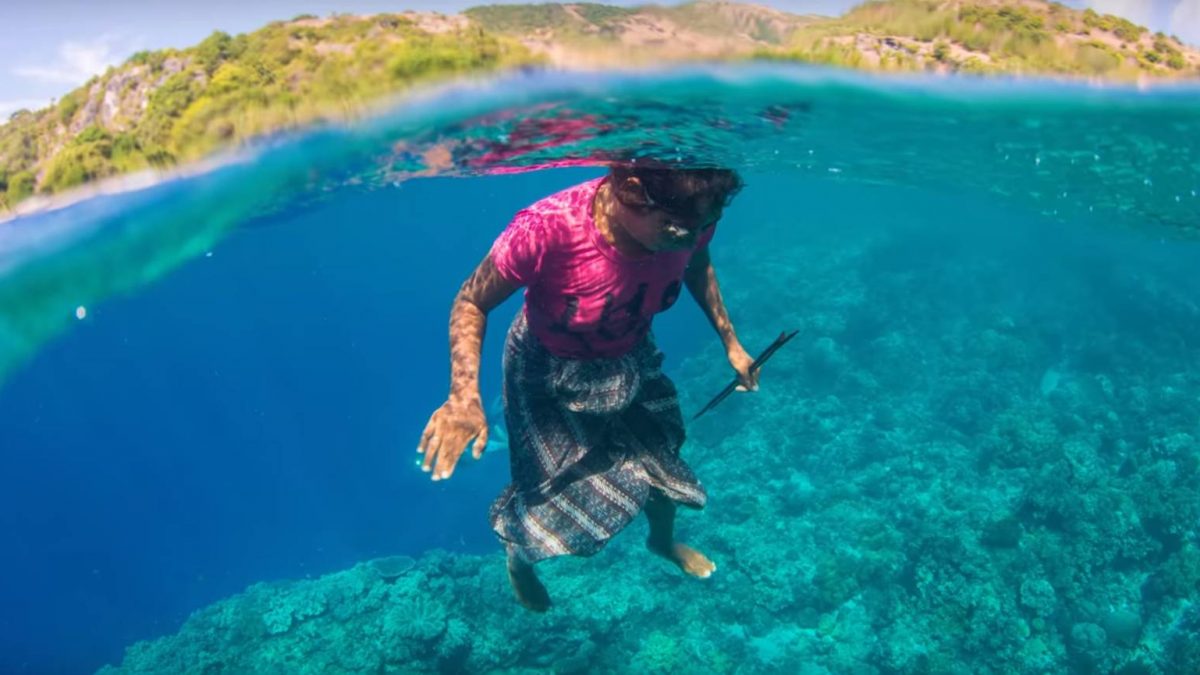Do you believe in Mermaids? You should because they exist in East Timor. These are the mermaids of Timor-Leste, known locally as the Wawata Topu (women divers). The forth episode of “Timor-Leste from Below” recorded them.
Episode 4: Timor-Leste Mermaids
“In this episode, we take you to the back of beyond Meet some fascinating women And photograph them spearfishing”
“My name is Bertie and this is Timor-Leste… “
“So we’re currently working our way around Atauro Island and I can even see a massive drop-off right here. I think this place might be heaven on Earth.”
“We’ve got pristine white beaches, rolling undulating hills, we’re the only boat out on the ocean and today we’re off to meet a group of women who I’ve heard has a rather unique bond with the ocean.”
“On the surface, the idyllic island village of Adara seems like a typical sleepy seaside settlement. However, don’t be fooled.”
“These are the Wawata Topu, a group of women determined to break the mold.”
“Traditionally an exclusive male profession, some ladies have taken to the water to make a living. And today they have allowed me to join them, foraging below the waves.”
“The ladies seem to be having an amazing time and they make it look so easy as well. Here’s me struggling with fins and they’re just up and down, up and down. Having a great time.”
“Look at those traditional goggles – amazing Right, back to it! Scanning over the sea bed, the ladies in their traditional sarongs and handmade goggles effortlessly duck dive to collect shells, clams or to spear reef fish”
“Spearfishing is one of the oldest forms of fishing in the world, with records dating back 16,000 years. This simple yet skilful task requires hours of practice to perfect. Artisanal fishing in this way is very low impact compared to industrial practices …and, makes for some awesome imagery.”
“So I’ve seen some incredible things around the world but this is definitely up there with them.”
“We’re on a remote beach in Timor-Leste. We’ve got these lovely women here who are dressed in their colorful clothing, they’ve got their traditional goggles on. I think they’ve caught some fish for dinner.”
“We’ve got some amazing imagery so a very successful day.”
“With their work done for the day I wanted to find out a little more about the history of the Wawata Topu.”
“So ladies, first of all, thank you so much for inviting me into your community and for agreeing to speak to me today. So maybe you could tell me a little bit about how you first started fishing? And why is it in this community that it’s the women and the men that fish together? And what do you do with the fish afterward? Do we eat them or do you sell them or is it both? So you’ve been fishing for a long time, have you noticed many changes to the reef? And is there a final message that you’d like to say to us or any message for our viewers”
“So thank you so much for speaking to me again and for welcoming me into your home and Obrigado.”
“Meeting the women divers of Adara was a real privilege. But their sentiments about catching less fish compared to the past are an all too familiar story.”
“Hopefully, with the recent establishment of a locally managed marine area, the women will begin to catch more fish, as stocks from the protected reserve spill over into their usual fishing grounds.”
“And who knows, perhaps in the future more tourists will come, to learn the ways of the Wawata Topu.”
What is SZtv?
SZtv is the new channel of original stories about wildlife and conservation from Scubazoo, an award-winning, independent production company based in Sabah, Malaysian Borneo for the last twenty years.


Stay connected